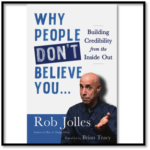A BLArticle® Miniseries
Part 1
“Sometimes a book just finds you…”
 I’ve been conducting seminars for over 30 years, and I thought I understood what almost every audience needed. Back in the summer of 2012, nothing could have prepared me for the audience I met in a church in McLean, Virginia. Prior to that presentation, I had received a call from my friend Will; he told me about a group that he had been volunteering with for the past few years, and they needed good motivational speakers. The group he spoke of was a large weekly meeting for people (of all religions) who were looking for jobs. I thought “large” meant ten or fifteen people, not over two hundred people!
I’ve been conducting seminars for over 30 years, and I thought I understood what almost every audience needed. Back in the summer of 2012, nothing could have prepared me for the audience I met in a church in McLean, Virginia. Prior to that presentation, I had received a call from my friend Will; he told me about a group that he had been volunteering with for the past few years, and they needed good motivational speakers. The group he spoke of was a large weekly meeting for people (of all religions) who were looking for jobs. I thought “large” meant ten or fifteen people, not over two hundred people!
The presentation I planned to deliver was one I had given countless times. I figured teaching this group how to sell would be just what the doctor ordered. Besides, I didn’t think it would be very difficult to teach these folks how to sell themselves in a job interview. They listened to my stories, and I listened to theirs. I was moved by the stories that I heard, and I knew I had found a place where I wanted to volunteer every week.
For the first few months, I tried to use my work in teaching sales skills, and I worked hard at taking those sales skills and converting them to skills that would help people to sell themselves to an employer. Unfortunately, no one seemed to be benefiting from what I was saying.
Assuming that these people just weren’t using the right words, I began to help in the writing of the words they needed to use, but I failed again. The words were right, but they weren’t believable when they spoke them. It was like listening to someone trying to sing a song, but all the notes were flat.
I began to think about this: Just because it might be easy for some to speak, why couldn’t I teach anyone how to say words in a convincing manner? In the case of someone who does not naturally communicate well, could I teach him or her how to say the words in a more believable way? It’s astonishing how much faith we put into our words, and yet…
It’s not the Words… It’s the Tune that adds the human element to how we communicate and makes us truly believable.
For some, the simple act of being believed, although natural, can always be improved. For others, it can represent a lifetime struggle, and the repercussions can be life altering. Whenyoulook at the number of people who are affected by it in one way or another, it may be one of the most significant personality epidemics our society faces. I needed to focus on not only what they were saying, but also on howthey were saying it.
Because of these meetings over the past six years, I realized there was a need for a book that would help people to present themselves in a believable and powerful way. I had no idea a book was forming; I just knew there was an underserved part of the population that was in desperate need of tools beyond the words they used. I had learned how to help people understand “Why People Don’t Believe You.” A book was born, and in this case, sometimes a book just finds you.


Thanks Rob for yet another promising piece of advice. You touched upon a great point that is hard to teach. Even hard to grasp…Looking forward to read it (or listen to it).
Well, I’m looking forward to having you read it! Thanks for posting Hussein!
Thanks Rob, the piece is superb! You hit the nail on the head, esp. “It’s not the Words… It’s the Tune that adds the human element to how we communicate and makes us truly believable.” That’s the art. Conversely, sometimes one may have the true, accurate feelings or beliefs, but not convey in the right or fitting words. So, communication struggles vary, and that’s why I believe communication is a lifelong-learning skill.
What I’m hoping is the book not only identifies the problem, but provides simple, reasonable ways to address these problems. It is a lifelong learning skills; one I’m still learning! Thanks for posting Hui!